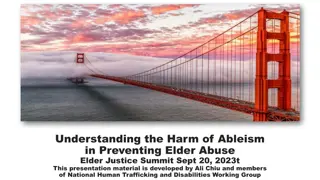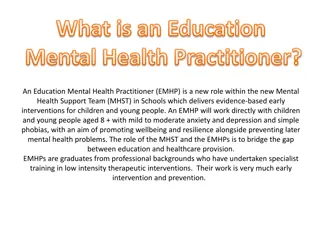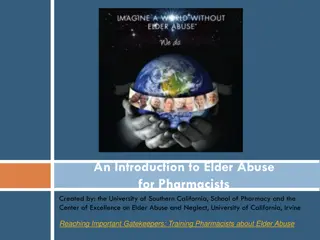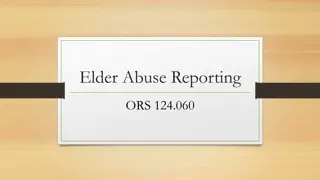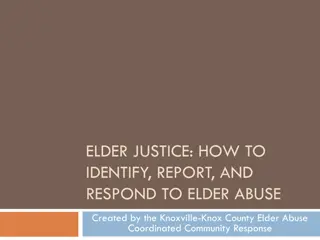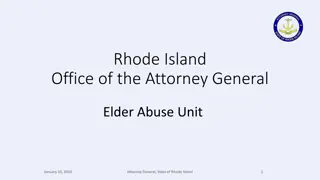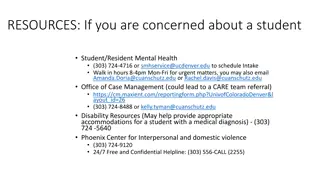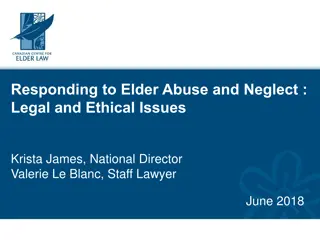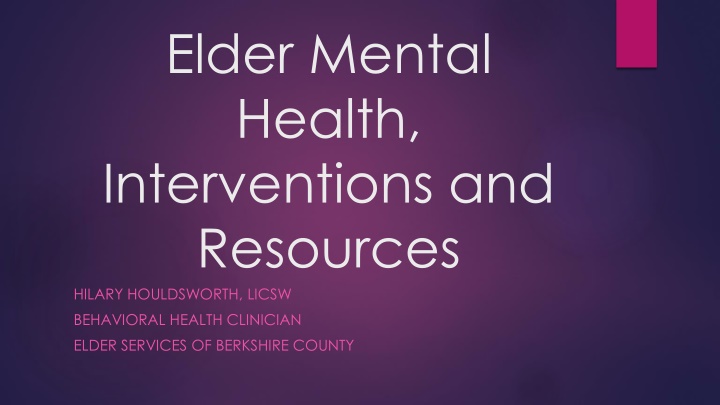
Elder Mental Health Interventions and Resources in Massachusetts
Learn about mental health challenges in older adults, including symptoms of anxiety and depression, suicide risks, and prevention strategies. Discover potential referrals and resources available in Berkshire County to support the mental well-being of seniors.
Uploaded on | 0 Views
Download Presentation

Please find below an Image/Link to download the presentation.
The content on the website is provided AS IS for your information and personal use only. It may not be sold, licensed, or shared on other websites without obtaining consent from the author. If you encounter any issues during the download, it is possible that the publisher has removed the file from their server.
You are allowed to download the files provided on this website for personal or commercial use, subject to the condition that they are used lawfully. All files are the property of their respective owners.
The content on the website is provided AS IS for your information and personal use only. It may not be sold, licensed, or shared on other websites without obtaining consent from the author.
E N D
Presentation Transcript
Elder Mental Health, Interventions and Resources HILARY HOULDSWORTH, LICSW BEHAVIORAL HEALTH CLINICIAN ELDER SERVICES OF BERKSHIRE COUNTY
Mental Health in Older Adults Symptoms of anxiety and depression may increase in older adults for a variety of reasons, however, anxiety and depression are not normal parts of aging. Some mental health conditions, such as bipolar disorder and psychotic disorders may manifest later in life Issues with substance use may increase for older adults, again for a variety of reasons, and this is also not a normal part of aging. Older adults can address these symptoms, get help and make positive changes! When offering referrals or making suggestions, consider situational solutions, environmental factors, and hierarchy of needs
Suicide in Older Adults Older adults have the highest suicide rates in Massachusetts Older adults tend to use more lethal means and have a more thought out plan Men tend to use firearms Women are more likely to overdose on medications or poison Older adults may be less likely to tell someone their thoughts or plan Older adults may experience increased isolation, resulting in suicide attempts having a greater risk of fatality due to lack of intervention
Suicide Prevention in Older Adults Decrease isolation Peer support Mental health services- individual or group therapy Decrease access to lethal means Utilize local Counsel on Aging/ Senior Center for socialization and activities Consider access to basic needs; such as food, housing, medications Access to transportation
Potential Referrals & Resources The Brien Center for Mental Health & Substance Use Services Berkshire Coalition for Suicide Prevention Clinical and Support Options Elder Services of Berkshire County Senior Centers SHINE Religious Organizations Home Delivered Meals Christian Center Housing Options Counseling Food Banks EMHOT (elder Mental Health Outreach Team) Medication Lock boxes Volunteer Opportunities NAMI
Hoarding Disorder The DSM-5 defines Hoarding Disorder as; Persistent difficulty discarding items regardless of value This difficulty is due to a perceived need to save the items and distress associated with discarding them Clutter in active living areas limits use of the space Stress and impairment associated with discarding greatly diminishes quality of life The clutter is not the result of another mental or physical health challenge
Hoarding Disorder, Cont. Hoarding Disorder tends to appear early in life and spans well into the late stages. Symptoms typically begin to emerge around 11-15 years old and start interfering with everyday functioning by the mid 20 s. Hoarding Disorder is not unique to older adults An estimated 6% of the worlds population struggles with HD Clutter does not always equal HD Squalor (AKA Domestic Environmental Neglect) The presence of hazardous items like mold, trash or worn out items does not necessarily indicate HD, though these conditions may be present in the home of someone with HD
HD Interventions What helps people with HD? Peer support, Trained in home decluttering partners, Cognitive Behavioral Therapy, Buried in Treasures Workshops, 12 step groups (CLA: Clutterers Anonymous) motivation, insight and hope! Building Rapport: Strengths Based & Person Centered The first step is building trust and motivation Ask questions like Is reducing clutter important to you? If so, what would you like to accomplish? Is organizing difficult for you? If so, what makes it hard? Are you attached to items that are preventing you from passing inspection?
What is not helpful Calling someone a hoarder Alternatives can be: A person with Hoarding Disorder, a collector, finder keepers, treasure hunters Forced cleanouts, threats, secretly throwing items away There are not medications that are proven to reduce the symptoms of HD, but medications can manage co-occurring disorders which can be helpful
Resources for Hoarding Disorder Mutual Support Consulting, LLC Information and resources on HD, trained in home decluttering partners Buried in Treasures Workshop Western MA Hoarding Disorder Resource Network Clutterers Anonymous Groups clutterersanonymous.org ServiceNet OCD and Hoarding Disorder Program (Virtual)
Non-Reversible Dementia Alzheimer's Disease- Accounts for 60-80% of all dementia diagnosis Vascular dementia Lewy body dementia Chronic traumatic encephalopathy (CTE) Parkinson's disease Frontotemporal dementia (FTD)
Alzheimers Disease Early on in the progression of Alzheimer's disease, normally harmless proteins called beta amyloids start building up abnormal "sticky" plaque deposits between neurons in the parts of the brain that control memory, thinking, judgment, personality, and behavior. The accumulation of these plaques makes it difficult for neurons to send signals back and forth, because the plaques get in the way of the neurotransmitters. Researchers believe that the buildup of these sticky plaques begins to damage the neurons. Gradually, as a result of plaque build-up between neurons and tangles inside of neurons, they begin to die. This is why Alzheimer's disease is referred to as degenerative, because as the brain cells stop functioning normally and die, the brain literally begins to decrease in size. (Cader.bu.edu)
Behavioral Changes in Dementia Early Stages- the person may experience anger and frustration as they notice a decline in memory or independence. This is a confusing and fearful time for the individual. As the dementia progresses, the older adult may begin to have behaviors that impact their relationships with others. The person may have outbursts of frustration, confusion and suspicion of others as cognition declines. This is associated with the brain cells that control emotions being compromised. Sun downing- state of confusion in the evening and often through the night that can increase confusion, agitation, anxiety and disorientation.
Consider environmental factors- Often, something in the persons environment is aggravating or overstimulating to them. Is the room too hot? Are there too many people in the room? Is the TV too loud? These are things to be sensitive of as they may be distressing to the older adult with dementia. Consider your own physiological reaction to this type of behavior. Observe the behavior, do not take it personally. Remember, all behavior is a form of communication. Maintaining routine, predictability, labeling items and/or having items needed frequently easy to find/utilize Dementia Coaching for Caregivers Consult with Primary Care Physician
Elder Neglect and Abuse Financial abuse Physical abuse Sexual abuse Elder neglect Self neglect Competence is a judgment made by a court of law about an individual's mental capacity to make the decisions necessary to keep him safe. Only a court of law can decide questions of competency. Capacity is a medical judgment, not than a legal term, referring to a person's ability to make health care and other decisions in his own behalf.
Mandated Reporting & Elder Protective Services Police Officers are required by law to report witnessed, reported or suspected financial, physical, sexual abuse or neglect to the proper entity. This includes self neglect. Berkshire Elder Protective Services provides assistance to those 60 and older who are victims of abuse, neglect, financial exploitation by another person, or are self-neglecting. To file a report, contact the Elder Abuse Hotline at 1-800-922-2275 or https://www.mass.gov/how-to/report-elder-abuse
Caregiver Stress Understandably, Caregivers often experience stress, frustration, sadness and even anger in their role as caregiver or towards the person they care give for. Caregivers often miss work, need to decrease work hours or take a leave of absence to care give, resulting in financial hardships. Caregivers may struggle with how to handle their loved ones decline, weather or not to explain the conditions to them (mostly with dementia) and when the need for a higher level of care is needed, such as a skilled nursing facility.
Caregiver Resources Local Counsels on Aging often have Caregiver Support Groups Pittsfield Senior Center Supportive Day Program Dementia Coaching Elder Services of Berkshire County Caregiver Coordination Program Homecare Services
References Behavioral Health and Aging. (2023). Cader.bu.edu. Retrieved January 5, 2024, from https://cader.bu.edu/ultra/course American Psychiatric Association: Diagnostic and Statistical Manual of Mental Disorders: Diagnostic and Statistical Manual of Mental Disorders, Fifth Edition, Text Revision. Arlington, VA: American Psychiatric Association, 2022. Shuer, L., & Belofsky, B. (2023.). Hoarding Disorder: Fact, Fiction, and Family. Hoarding Disorder: The Basics.

